Howard County, Maryland
Howard County is located in the central part of the U.S. state of Maryland. As of the 2010 census, the population was 287,085.[1] Its county seat is Ellicott City.[2]
Howard County | |
|---|---|
| Howard County | |
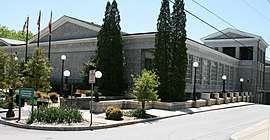 The Howard County Courthouse in May 2008 | |
 Flag 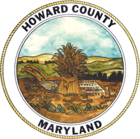 Seal | |
| Nickname(s): "HoCo" | |
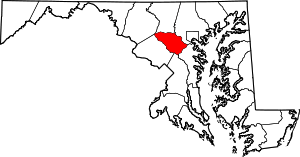 Location within the U.S. state of Maryland | |
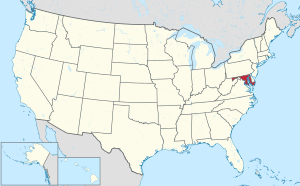 Maryland's location within the U.S. | |
| Coordinates: 39°15′N 76°56′W | |
| Country | |
| State | |
| Founded | May 13, 1838 |
| Named for | John Eager Howard |
| Seat | Ellicott City |
| Largest community | Columbia |
| Area | |
| • Total | 253 sq mi (660 km2) |
| • Land | 251 sq mi (650 km2) |
| • Water | 2.7 sq mi (7 km2) 1.0%% |
| Population (2010) | |
| • Total | 287,085 |
| • Estimate (2019) | 325,690 |
| • Density | 1,100/sq mi (440/km2) |
| Time zone | UTC−5 (Eastern) |
| • Summer (DST) | UTC−4 (EDT) |
| Congressional districts | 2nd, 3rd, 7th |
| Website | www |
Howard County is included in the Baltimore-Columbia-Towson, MD Metropolitan Statistical Area, which is also included in the Washington-Baltimore-Arlington, DC-MD-VA-WV-PA Combined Statistical Area. However, recent development in the south of the county has led to some realignment towards the Washington, D.C. media and employment markets. The county is home to Columbia, a major planned community of approximately 100,000 founded by developer James Rouse in 1967.
Howard County is frequently cited for its affluence, quality of life, and excellent schools. With an estimated median household income of $120,194 in 2016, Howard County had the second-highest median household income of any U.S. county in 2016.[3] Many of the most affluent communities in the Baltimore-Washington Metropolitan Area, such as Clarksville, Dayton, Glenelg, Glenwood, and West Friendship, are located along the Route 32 corridor in Howard County. The main population center of Columbia/Ellicott City was named second among Money magazine's 2010 survey of "America's Best Places to Live."[4]
In 2010, the center of population of Maryland was located in the Howard County town of Jessup.[5]
Etymology
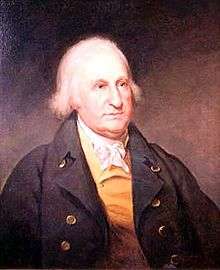
The name of the county honors Colonel John Eager Howard,[6] an officer in the "Maryland Line" of the Continental Army in the American Revolutionary War, commander notably at the Battle of Cowpens in South Carolina in 1781, among others. He was the fifth governor of Maryland from 1788 to 1791.[7]
History

The lands of prehistoric Howard County were populated by Native Americans. The Maryland Historical Trust has documented sites along the Patapsco, Patuxent, Middle and Little Patuxent River valleys.[8] In 1652, the Susquehannock tribes signed a peace treaty with Maryland, giving up their provenance over the territory that is now Howard County.[9] In 1800, the mean center of U.S. population as calculated by the US Census Bureau was found in what is now Howard County.[10]
In 1838, Dr. William Watkins of Richland Manor proposed the "Howard District" of Anne Arundel County.[11] After several adjournments, the area of western Anne Arundel County was designated the Howard District in 1839.[12] The district had the same status as a county except that it was not separately represented in the Maryland General Assembly. In 1841, the county built its first courthouse in Ellicott City.[13] At the January 1851 constitutional convention, Thomas Beale Dorsey submitted a petition led by James Sykes. A committee was formed with Dorsey, Bowie, Smith, Harbine and Ricaud. After several postponements, the district was erected officially as Howard County on March 7, 1851.[14]
The plantations of modern Howard County used slave labor as early as 1690. At the time of the Underground Railroad, some Howard County residents assisted slaves who were escaping to freedom. This was particularly risky, as many prominent plantation families were Confederate sympathizers during the Civil War, contributing militiamen to the South to protect local interests.[15] Maryland was exempt from the Emancipation Proclamation, later abolishing slavery in the update of the Maryland Constitution in November 1864.[16]
On May 1, 1883 Howard County joined Anne Arundel County and Harford County in liquor prohibition.[17]
By 1899, Howard County contained 400 miles (640 km) of dirt and 48 miles (77 km) of stone roads, including three paid turnpikes maintained by 118 men. Most traffic consisted of loads delivered to rail crossings.[18] In 1909, County Commissioners Hess, Werner and O'Neil were charged with malfeasance regarding contract bids.[19]
In 1918, a deadly flu pandemic swept the county starting with an early outbreak in Camp Meade in adjacent Anne Arundel County.[20][21] The 1930s saw a shift from one-room schoolhouses to centralized schools with bus service. By 1939 wheat harvesting fell to just 18,800 acres (7,600 ha).[22] In 1940, local newspaper owner Paul Griffith Stromberg led a five-county commission to study a superhighway between Baltimore and Washington through Howard County.[23] The Federal Aid Highway Act of 1956 eventually led to the construction of Interstate 70 across northern Howard County and Interstate 95 across the eastern part of the county.[24] The sparsely populated county hosted population centers in Ellicott City, Elkridge, Savage, North Laurel and Lisbon with W.R. Grace and Johns Hopkins Applied Physics Lab as the largest new employers. Residents elected officials that campaigned to keep the county rural while planners prepared public works to support a quarter million residents by the year 2000. Race relations and desegregation became major issues of the time.[25]
From 1963 to 1966 the Rouse Company bought 14,000 acres (5,700 ha) of land and rezoned it for the Columbia Development. In 1972, the Marriott company proposed to build a regional theme park on Rouse-owned land but was denied zoning.[26]
The county has a number of properties on the National Register of Historic Places.[27]
Geography
According to the U.S. Census Bureau, the county has a total area of 253 square miles (660 km2), of which 251 square miles (650 km2) is land and 2.7 square miles (7.0 km2) (1.0%) is water.[28] It is the second-smallest county in Maryland by land area and smallest by total area.

Howard County is located in the Piedmont Plateau region of Maryland, with rolling hills making up most of the landscape. It is bounded on the north and northeast by the Patapsco River, on the southwest by the Patuxent River, and on the southeast by a land border with Anne Arundel County. Both the Patapsco and Patuxent run largely through publicly accessible parkland along the county borders. The Patuxent border includes the Triadelphia and Rocky Gorge reservoirs.
Adjacent counties
- Anne Arundel County (southeast)
- Baltimore County (northeast)
- Carroll County (north)
- Frederick County (northwest)
- Montgomery County (southwest)
- Prince George's County (south)
Climate
Howard County lies in the humid subtropical climate zone. As one travels west in the county away from the Baltimore area, the winter temperatures get lower and winter snow is more common. Annual rainfall is about 45 inches (1,100 mm) throughout the county.[30] Over a 60-year period from 1950 to 2010, there were 394 National Climatic Data Center reportable events causing 617 injuries, and 99 fatalities. There were 9 reported tornadoes, reaching a maximum of F2, with no recorded fatalities.[31]
Demographics
| Historical population | |||
|---|---|---|---|
| Census | Pop. | %± | |
| 1860 | 13,338 | — | |
| 1870 | 14,150 | 6.1% | |
| 1880 | 16,140 | 14.1% | |
| 1890 | 16,269 | 0.8% | |
| 1900 | 16,715 | 2.7% | |
| 1910 | 16,106 | −3.6% | |
| 1920 | 15,826 | −1.7% | |
| 1930 | 16,169 | 2.2% | |
| 1940 | 17,175 | 6.2% | |
| 1950 | 23,119 | 34.6% | |
| 1960 | 36,152 | 56.4% | |
| 1970 | 61,911 | 71.3% | |
| 1980 | 118,572 | 91.5% | |
| 1990 | 187,328 | 58.0% | |
| 2000 | 247,842 | 32.3% | |
| 2010 | 287,085 | 15.8% | |
| Est. 2019 | 325,690 | [32] | 13.4% |
| U.S. Decennial Census[33] 1790-1960[34] 1900-1990[35] 1990-2000[36] 2010–2018[1] | |||
2000 census
As of the census[37] of 2000, there were 247,842 people, 90,043 households, and 65,821 families residing in the county. The population density was 983 people per square mile (380/km2). There were 92,818 housing units at an average density of 368 per square mile (142/km2). The racial makeup of the county was 74.33% White, 14.42% Black, 0.24% Native American, 7.68% Asian, 0.04% Pacific Islander, 1.11% from other races, and 2.19% from two or more races. 3.02% of the population were Hispanic or Latino of any race. 15.1% were of German, 11.0% Irish, 9.3% English, 6.6% Italian and 5.7% American ancestry.
There were 90,043 households, out of which 40.00% had children under the age of 18 living with them, 60.50% were married couples living together, 9.50% had a female householder with no husband present, and 26.90% were non-families. 20.80% of all households were made up of individuals, and 4.60% had someone living alone who was 65 years of age or older. The average household size was 2.71, and the average family size was 3.18.
In the county, the population was spread out, with 28.10% under the age of 18, 6.30% from 18 to 24, 34.40% from 25 to 44, 23.80% from 45 to 64, and 7.50% who were 65 years of age or older. The median age was 36 years. For every 100 females, there were 96.60 males. For every 100 females age 18 and over, there were 92.90 males.
The median income for a household in the county was $101,003, and the median income for a family was $117,186 in 2009. The per capita income was $44,120. About 2.70% of families and 4.00% of the population were below the poverty line.
2010 census
As of the 2010 United States Census, there were 287,085 people, 104,749 households, and 76,333 families residing in the county.[38] The population density was 1,144.9 inhabitants per square mile (442.0/km2). There were 109,282 housing units at an average density of 435.8 per square mile (168.3/km2).[39] The racial makeup of the county was 62.2% white, 17.5% Black or African American, 14.4% Asian, 0.3% American Indian, 2.0% from other races, and 3.6% from two or more races. Those of Hispanic or Latino origin made up 5.8% of the population.[38] In terms of ancestry, 17.7% were German, 13.9% were Irish, 10.6% were English, 7.0% were Italian, and 4.6% were American.[40]
Of the 104,749 households, 39.3% had children under the age of 18 living with them, 58.9% were married couples living together, 10.5% had a female householder with no husband present, 27.1% were non-families, and 21.9% of all households were made up of individuals. The average household size was 2.72, and the average family size was 3.20. The median age was 38.4 years.[38]
The median income for a household in the county was $103,273, and the median income for a family was $119,810. Males had a median income of $82,307 versus $59,128 for females. The per capita income for the county was $45,294. About 2.8% of families and 4.2% of the population were below the poverty line, including 4.6% of those under age 18 and 5.5% of those age 65 or over.[41]
Education
The Howard County Public School System manages 71 schools and serves approximately 49,000 students. The graduation rate from this school district was 90.4% in 2009,[42] and the county's schools are ranked among the best in the state. Student test scores consistently top the list for all Maryland school districts. Howard High School is currently the largest school in the county with over 1,700 students.
Library
In 2013 Howard County Library System was selected as the Library of the Year by Library Journal[43] and cited by editor-at-large, John N. Berry, as "a 21st-century library model, with a position, doctrine, purpose, and curriculum worthy of study and consideration by every library in America, if not the world." In 2015 the Howard County Library System was designated the top Star Library in its class.[44]
Under the library's sponsorship, a campaign called "Choose Civility" started in Howard County in 2006. According to its website, "Choose Civility is an ongoing community-wide initiative, led by Howard County Library, to position Howard County as a model of civility. The project intends to enhance respect, empathy, consideration and tolerance in Howard County." The campaign's distinctive green bumper stickers are often seen in Howard County and neighboring areas.
Politics and government
Howard County has voted for the Democratic presidential candidate in every election from 1992 on. The less-populated western and northern parts of Howard County lean Republican. The more heavily populated southern and eastern parts are heavily Democratic. The county has voted for Democrats at the state and federal level, though it voted for Republican Bob Ehrlich in the 2002 gubernatorial election over Democrat Kathleen Kennedy Townsend and Larry Hogan over Democrat Anthony G. Brown in the 2014 gubernatorial election.
At the state level, Howard County is represented by six Democrats and three Republicans in the Maryland House of Delegates. It is represented by two Democrats and one Republican in the Maryland Senate. The one Republican state senator from the county represents a district that spills into heavily Republican Carroll County to the north, as do two of the three state delegates.
From 1914 to 1968, Howard County was governed by a system of three elected commissioners with four-year terms.[45] Prior to 1962, the only polling location in the county was located in Ellicott City. In May 1962, voters were offered a second location to vote, also in Ellicott City at the National Armory on Montgomery Road.[46] Senator James Clark proposed a five-person County Council and a County Executive in 1965.[47] In 1968, the county implemented a charter form of government.[48] In 1984 a councilmanic referendum was approved, switching council from at-large representation to district representation.[49] The County Council serves as the county's legislative branch; members also provide constituent service and sit as members of the Zoning Board and Liquor Board. The current Howard County Executive is Democrat Calvin Ball III, who was elected in November 2018 and took office on December 3, 2018.[50] Most of the county is in Maryland's 7th congressional district, which was represented by Democrat Elijah Cummings until his 2019 death. The district is now represented by Kweisi Mfume. A small portion is in Maryland's 3rd congressional district, represented by Democrat John Sarbanes.
| Year | Republican | Democratic | Third parties |
|---|---|---|---|
| 2016 | 29.3% 47,484 | 63.3% 102,597 | 7.5% 12,112 |
| 2012 | 37.7% 57,758 | 59.7% 91,393 | 2.6% 3,957 |
| 2008 | 38.1% 55,393 | 60.0% 87,120 | 1.9% 2,720 |
| 2004 | 44.6% 59,724 | 54.0% 72,257 | 1.4% 1,829 |
| 2000 | 44.2% 49,809 | 51.9% 58,556 | 3.9% 4,414 |
| 1996 | 42.8% 40,849 | 49.8% 47,569 | 7.4% 7,090 |
| 1992 | 38.7% 38,594 | 44.9% 44,763 | 16.5% 16,441 |
| 1988 | 56.2% 44,153 | 43.3% 34,007 | 0.5% 370 |
| 1984 | 57.8% 35,641 | 41.7% 25,713 | 0.5% 334 |
| 1980 | 47.0% 24,272 | 40.1% 20,702 | 12.8% 6,625 |
| 1976 | 50.8% 21,200 | 49.2% 20,533 | |
| 1972 | 63.6% 19,265 | 35.2% 10,668 | 1.3% 383 |
| 1968 | 53.8% 9,957 | 31.1% 5,752 | 15.1% 2,796 |
| 1964 | 45.5% 6,833 | 54.5% 8,185 | |
| 1960 | 56.6% 7,051 | 43.4% 5,412 | 0.0% 2 |
| 1956 | 64.5% 6,534 | 35.5% 3,599 | |
| 1952 | 59.1% 5,497 | 39.7% 3,693 | 1.2% 112 |
| 1948 | 51.6% 3,113 | 45.2% 2,725 | 3.2% 190 |
| 1944 | 51.6% 3,344 | 48.4% 3,140 | |
| 1940 | 43.6% 3,082 | 56.0% 3,957 | 0.4% 30 |
| 1936 | 38.7% 2,638 | 60.6% 4,138 | 0.7% 49 |
| 1932 | 31.8% 1,970 | 67.2% 4,161 | 1.0% 59 |
| 1928 | 51.4% 3,296 | 48.1% 3,088 | 0.5% 33 |
| 1924 | 38.5% 1,989 | 53.9% 2,786 | 7.6% 394 |
| 1920 | 51.5% 2,608 | 47.3% 2,397 | 1.2% 63 |
| 1916 | 40.5% 1,346 | 57.6% 1,913 | 1.9% 64 |
| 1912 | 33.9% 1,004 | 51.5% 1,523 | 14.6% 433 |
| 1908 | 41.2% 1,276 | 57.0% 1,764 | 1.8% 57 |
| 1904 | 39.0% 1,258 | 59.3% 1,914 | 1.7% 54 |
| 1900 | 47.6% 1,800 | 50.3% 1,904 | 2.1% 79 |
County Council
The County Council adopts ordinances and resolutions, and has all of the County's legislative powers. There are five council districts throughout the county.[52] The current County Council as of December 2018 includes 4 Democrats and 1 Republican.
| District | Name | Party | Representing | |
|---|---|---|---|---|
| District 1 | Elizabeth Walsh | Democratic | Ellicott City, Elkridge | |
| District 2 | Opel Jones | Democratic | East Columbia, Elkridge | |
| District 3 | Christiana Rigby | Democratic | North Laurel, Jessup | |
| District 4 | Deb Jung | Democratic | Columbia, Fulton | |
| District 5 | David Yungmann | Republican | Western Howard County | |
County Commissioners
| Chairman name | Affiliation | Term | Commissioner name | Affiliation | Term | Commissioner name | Affiliation | Term | |
|---|---|---|---|---|---|---|---|---|---|
| George Howard[54] | 1840 | Zedekiah Moore | 1840 | Charles Worthington Dorsey | 1840 | ||||
| William H. Worthington | 1841–1845 | Wesley Linthicum | 1841–1845 | Perry Gaither | 1841 | ||||
| William H. Worthington | 1841–1845 | Wesley Linthicum | 1841–1845 | George W. Hobbs | 1842–1845 | ||||
| William H. Worthington | 1841–1845 | Wesley Linthicum | 1841-1845 | George W. Hobbs, Perry Gaither, William Welling | 1845 | ||||
| Samuel Brown | 1846 | William Hughes | 1846 | Reuben P. Hammond | 1846 | ||||
| William H. Worthington | 1847 | William Hughes | 1847 | George W. Hobbs, Charles R. Simpson | 1847 | ||||
| William Hughes | 1848–1849 | George Howard | 1848 | Charles R. Simpson, John Hood, Theodore Tubman | 1848 | ||||
| William Hughes | 1848–1849 | Theodore Tubman | 1848–1853 | Littleton Maclin, Thomas Burgess | 1849 | ||||
| Littleton Maclin | 1850 | Theodore Tubman | 1848-1853 | David E. Hopkins, David Feelemyer, Samuel Brown | 1850 | ||||
| Thomas B. Hobbs[55] | 1851 | Theodore Tubman | 1848–1853 | Samuel Nichols, Samuel Brown, David Clark, David Feelemyer | 1851 | ||||
| Theodore Tubman | 1848–1853 | David Clark | 1853 | David Feelemyer, George Bond | 1853 | ||||
| Slingsby Linthicum | 1854 | George Bond | 1854 | Steven B. Dorsey | 1854 | ||||
| George Bond | 1855 | Slingsby Linthicum | 1855 | Steven B. Dorsey, Theodore Tubman | 1855 | ||||
| Samuel Hopkins[56] | Republican | 1865 | |||||||
| John T. Ridgely[57] | 1885–1888 | Ephraim Collins | 1885– | B. C. Sunderland | 1885– | ||||
| Benjamin C. Sunderland | 1889–1892 | Benjamin F. Hess | 1889–1892 | Edmund Dorsey[58] | Republican | 1889–1892 | |||
| Benjamin F. Hess[59] | 1901–1904 | Thomas O' Neill | 1901–1904 | Jacob J. Werner | 1901–1904 | ||||
| Jacob J. Werner[60] | 1905–1907 | Benjamin F. Hess | 1905–1907 | Henry A Penny[55] | 1905–1911 | ||||
| Benjamin F. Hess[61] | 1908–1909 | Amos Howard Earp | 1908–1911 | Jacob J. Werner | 1908–1913 | ||||
| Amos Howard Earp[62][63] | 1911–1917 | Grosvenor Hanson | 1911–1915 | William H. Davis | 1911–1915 | ||||
| Amos Howard Earp[64] | 1915–1917 | Grosvenor Hanson | 1915–1917 | De Wilton C. Partlett | 1915–1917 | ||||
| Amos Howard Earp[65] | 1917–1919 | John H. Shaab | 1917–1919 | De Wilton C. Partlett | 1917–1919 | ||||
| Amos Howard Earp[66] | 1920–1926 | Daniel H. Gaither | 1920–1926 | De Wilton C. Parlett | 1920–1926 | ||||
| DeWilton C. Parlett[67] | 1926–1930 | H. Thomas Glimes | 1926–1930 | Daniel H. Gaither | 1926–1930 | ||||
| H. Grafton Penny[68] | Democrat | 1930–1934 | J. Frank Curtis | 1930–1934 | Daniel H. Gaither | 1930–1934 | |||
| H. Grafton Penny[69] | Democrat | 1935–1938 | Robert H. Mercer | Democrat | 1935–1938 | Hart B. Noll | Republican | 1935–1938 | |
| Charles E. Miller | Republican | 1938–1942 | |||||||
| James Franklin Curtis | Republican | 1942–1949 | Charles E. Miller | Republican | 1942–1949 | ||||
| Norman E. Moxley | Democrat | 1949–1957 | Roby H. Mullinix | Democrat | 1949–1954 | E. Walter Scott | Democrat | 1949–1954 | |
| Norman E. Moxley[70] | Democrat | 1958–1959 | Howard W. Clark | Democrat | 1957–1958 | Charles E. Harman | Democrat | 1957–1958 | |
| Charles M. Scott[71] | Democrat | 1959–1962 | Norman E. Moxley | Democrat | 1959–1962 | Arthur K. Pickett | Democrat | 1959–1962 | |
| Charles E. Miller | Republican | 1962–1966 | J. Hubert Black | Republican | 1962–1966 | David W. Force | Republican | 1962–1966 | |
| Charles E. Miller | Republican | 1966–1970 | J. Hubert Black | Republican | 1966–1970 | Ridgley Jones | Democrat | 1968–1970 |
County Executives and Council Members
| Name | Affiliation | Term | Council (Districts 1, 2, 3, 4, 5) | |
|---|---|---|---|---|
| Omar J. Jones | Democrat | 1969–1973 | Alva S. Baker, Edward L. Cochran, J. Hugh Nichols, Charles E. Miller, William S. Hanna[72] | |
| Edward L. Cochran | Democrat | 1974–1978 | Richard Anderson (Elizabeth Bobo - appointed),[73] Ruth Keeton, Lloyd Kowles, Virginia Thomas, Thomas Yeager[74] | |
| J. Hugh Nichols[75] | Democrat | 1978–1982 | Ruth U. Keeton, Elizabeth Bobo, Lloyd G. Knowles, Virginia M. Thomas, Thomas M. Yeager | |
| J. Hugh Nichols | Democrat | 1982–1986 | Ruth U. Keeton, Elizabeth Bobo, James C. Clark, C. Vernon Gray, Lloyd G. Knowles | |
| William E. Eakle[76][77] | Democrat | 1986 | Ruth U. Keeton, Elizabeth Bobo, James C. Clark, C. Vernon Gray, Lloyd G. Knowles | |
| Elizabeth Bobo | Democrat | 1986–1990 | Angela Beltram, C. Vernon Gray, Shane Pendergrass, Ruth Keeton, Charles Feaga | |
| Charles I. Ecker[78] | Republican | 1990–1994 | Darrel E. Drown, C. Vernon Gray, Shane Pendergrass, Paul R. Farragut, Charles Feaga | |
| Charles I. Ecker | Republican | 1994–1998 | Darrel E. Drown, C. Vernon Gray, Dennis R. Schrader, Mary C. Lorsung, Charles Feaga | |
| James N. Robey[79] | Democrat | 1998–2002 | Christopher J. Merdon, C. Vernon Gray, Guy Guzzone, Mary C. Lorsung, Allan H. Kittleman | |
| James N. Robey | Democrat | 2002–2006 | Christopher J. Merdon, David A. Rakes (Calvin Ball-appointed), Guy Guzzone, Ken Ulman, Allan H. Kittleman (Charles C. Feaga-appointed)[80][81] | |
| Kenneth Ulman | Democrat | 2006–2010 | Courtney Watson, Calvin Ball, Jen Terrasa, Mary Kay Sigaty, Greg Fox | |
| Kenneth Ulman | Democrat | 2010–2014 | Courtney Watson, Calvin Ball, Jen Terrasa, Mary Kay Sigaty, Greg Fox | |
| Allan H. Kittleman | Republican | 2014–2018 | Jon Weinstein, Calvin Ball, Jen Terrasa, Mary Kay Sigaty, Greg Fox | |
| Calvin Ball III | Democrat | 2018–present | Elizabeth Walsh, Opel Jones, Christiana Rigby, Deb Jung, David Yungmann |
Departments

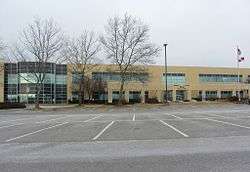
Economy
Statistics for July 2014 indicate that Howard County's unemployment rate is at 5.2 percent (7,527 persons).[82]
Howard County Public School System employs 8,136 of which 4,670 are teachers.[83] The County Government employs 3,323 outside of the school system with 672 police, 482 public works, and 472 fire and rescue employees.[84] The top ten private sector employers in Howard County are as follows:[85]
| # | Employer | # of Employees |
|---|---|---|
| 1 | Johns Hopkins University Applied Physics Laboratory | 5,000 |
| 2 | Verizon Wireless | 2,028 |
| 3 | Lorien Health Systems | 2,000 |
| 4 | Howard County General Hospital | 1,777 |
| 5 | Howard Community College | 1,294 |
| 6 | Leidos | 1,195 |
| 7 | Giant Food | 1,050 |
| 8 | The Columbia Association | 900 |
| 9 | Wells Fargo | 842 |
| 10 | Oracle Corporation subsidiary MICROS Systems | 815 |
Awards
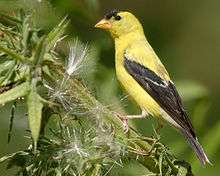
Awards and recognitions achieved by Howard County or locations within it include the following:
- "Best American Values", Newsmax Magazine: Ellicott City #17 (2009).[86]
- "Best Place to Live", CNN/Money: Columbia (#1 in 2016); Ellicott City/Columbia (#6 in 2014;[87] #8 in 2012;[88] #2 in 2010;[89] #8 in 2008;[90] #4 in 2006.[91])
- "Best Places to Live for Pet Lovers", CNN/Money: Ellicott City, one of 10 (2009).[92]
- "Best Place to Raise a Family", Forbes: #17 (2008).[93]
- "Good Sports Community of the Year", Sports Illustrated (2005)[94]
- "Great Public Library System", Hennen's American Public Library Ratings: #4 in population category in 2010; 8 times appearing in top 10 in a 10-year range.[95][96]
- "Healthiest Maryland County", University of Wisconsin Population Health Institute. (2013, 2012, 2011, 2010)[97][98][99][100]
- "Heart Safe Community of the Year", International Association of Fire Chiefs. (2012)[101]
- "Library of the Year", Library Journal. (2013)[102]
- "Preserve America Community", Advisory Council on Historic Preservation. (2013)[103]
- Top Outdoor Concert Venue for Merriweather Post Pavilion (a top five) by Pollstar (2012).[104]
- "Tree City Community", Arbor Day Foundation. (23 years)[105]
- "Venues that Rock", Rolling Stone: #4 outdoor venue, Merriweather Post Pavilion (2013).[106]
- "Winning Community", National Civic League. (2001)[107]
Culture and attractions
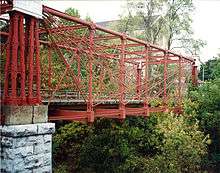

- Ballet Royale Institute of Maryland
- Blandair, an open space preserve
- Bollman Truss Railroad Bridge
- The Candlelight Concert Society
- The Chesapeake Shakespeare Company
- Clark's Elioak Farm
- Columbia Center for Theatrical Arts
- The Columbia Orchestra
- Ellicott City Historic Main Street
- Ellicott City Station
- The Enchanted Forest (closed – some features relocated to Clark's Elioak Farm)
- Howard County Center for the Arts
- Howard County Library
- Horowitz Visual and Performing Arts Center
- Larriland Pick-Your-Own Farm
- Merriweather Post Pavilion
- Rep Stage
- James and Anne Robinson Nature Center
- Savage Mill
- Shrine of St. Anthony
- Toby's Dinner Theatre
Transportation
Airports
Howard County does not have any public or commercial airport facilities. A 1967 Airport Study Commission recommended a facility for 150–250 aircraft to provide economic development, but was not initiated.[108] With the closure of Haysfield Airport, there is one privately owned airstrip, Glenair Airport in Glenelg.[109] Commercial air service is provided by Baltimore–Washington International Thurgood Marshall Airport, Ronald Reagan Washington National Airport, and Washington Dulles International Airport.
Public transportation
Bus routes that operate in Howard County are managed by the Regional Transportation Agency of Central Maryland and the Maryland Transit Administration.
Communities
Howard County has no incorporated municipalities.
Census-designated places
The Census Bureau recognizes the following Census-designated places in the county:
- Columbia
- Elkridge
- Ellicott City (county seat)
- Fulton
- Highland
- Ilchester
- Jessup (partly in Anne Arundel County)
- North Laurel
- Savage
- Scaggsville
Unincorporated communities
Unincorporated places not listed as Census-designated places but known in the area include:
References
- "State & County QuickFacts". United States Census Bureau. Archived from the original on June 6, 2011. Retrieved September 12, 2014.
- "Find a County". National Association of Counties. Archived from the original on May 31, 2011. Retrieved June 7, 2011.
- "Selected Economic Characteristics: 2012 American Community Survey 1-Year Estimates (DP03): All Counties Within United States". U.S. Census Bureau, American Factfinder. Archived from the original on February 12, 2020. Retrieved August 11, 2014.
- "CNN Money Magazine: 2010 Best Places To Live". Archived from the original on August 6, 2010. Retrieved August 4, 2010.
- "Centers of Population by State: 2010". United States Census Bureau. Archived from the original on January 3, 2014. Retrieved September 13, 2014.
- Gannett, Henry (1905). The Origin of Certain Place Names in the United States. Govt. Print. Off. pp. 162.
- "Howard County History". Howard Life. Archived from the original on December 10, 2010. Retrieved October 26, 2010.
- M. Lee Preston, Jr. Archaeology In Howard County and Beyond. p. 21.
- Ethan Allen, Libertus Van Bokkelen. History of Maryland. p. 36.
- "Mean Center of Population of the United States" (PDF). Retrieved October 6, 2010.
- Howard's Roads to the Past. p. 2.
- "Maryland Legislature". The Baltimore Sun. January 19, 1839.
- "Howard County Buildings" (PDF). Archived from the original (PDF) on December 3, 2013. Retrieved April 7, 2013.
- Joshua Dorsey Warfield. The founders of Anne Arundel and Howard Counties, Maryland. p. 522.
- Seeking Freedom The History of the Underground Railroad in Howard County. p. 54.
- Moss, Paulina C; Levirn Hill; Howard County Center of African American Culture (2002). Seeking freedom : a history of the underground railroad in Howard County, Maryland. Columbia, MD: Howard County Center of African American Culture. OCLC 50728274.
- "Prohibition in Maryland". Christian Advocate: 312. May 17, 1883.
- Maryland Geological Survey Report on the Highways of Maryland. 1899. p. 239.
- "Commissioners are Indicted". Times Dispatch. September 15, 1907.
- James A. Clark, Jr. Jim Clark Soldier Farmer Legislator. p. 11.
- "Baltimore MD and the 1918 Flu". Retrieved September 14, 2014.
- "From Greater Production to More Efficiency". March 31, 1965.
- Vest, Louise (March 3, 2015). "Doctor receives distinct honor in 1970". The Baltimore Sun.
- Weingroff, Richard F. "Federal-Aid Highway Act of 1956, Creating the Interstate System". Archived from the original on November 11, 2010. Retrieved November 9, 2010.
- Joseph Rocco Mitchell, David L Stebenne. New City Upon a Hill. p. 55.
- Edward Walsh (June 14, 1972). "Recreation Park Planners Woo Howard County". The Washington Post.
- "National Register Information System". National Register of Historic Places. National Park Service. April 15, 2008.
- "2010 Census Gazetteer Files". United States Census Bureau. August 22, 2012. Archived from the original on September 13, 2014. Retrieved September 12, 2014.
- "County Symbols". www.howardcountymd.gov.
- "CLARKSVILLE 3 NNE, HOWARD COUNTY, MARYLAND USA". Retrieved March 14, 2011.
- "NOAA National Climatic Weather Center Search". Archived from the original on August 1, 2008. Retrieved March 14, 2011.
- "Population and Housing Unit Estimates". Retrieved April 26, 2019.
- "U.S. Decennial Census". United States Census Bureau. Retrieved September 12, 2014.
- "Historical Census Browser". University of Virginia Library. Retrieved September 12, 2014.
- "Population of Counties by Decennial Census: 1900 to 1990". United States Census Bureau. Retrieved September 12, 2014.
- "Census 2000 PHC-T-4. Ranking Tables for Counties: 1990 and 2000" (PDF). United States Census Bureau. Retrieved September 12, 2014.
- "U.S. Census website". United States Census Bureau. Retrieved January 31, 2008.
- "DP-1 Profile of General Population and Housing Characteristics: 2010 Demographic Profile Data". United States Census Bureau. Archived from the original on February 13, 2020. Retrieved January 22, 2016.
- "Population, Housing Units, Area, and Density: 2010 - County". United States Census Bureau. Archived from the original on February 13, 2020. Retrieved January 22, 2016.
- "DP02 SELECTED SOCIAL CHARACTERISTICS IN THE UNITED STATES – 2006-2010 American Community Survey 5-Year Estimates". United States Census Bureau. Archived from the original on February 13, 2020. Retrieved January 22, 2016.
- "DP03 SELECTED ECONOMIC CHARACTERISTICS – 2006-2010 American Community Survey 5-Year Estimates". United States Census Bureau. Archived from the original on February 13, 2020. Retrieved January 22, 2016.
- "High School Graduation Rates in Maryland" (PDF). University of Maryland. University of Maryland. January 2014. Archived from the original (PDF) on February 2, 2017. Retrieved August 1, 2016.
- Berry III, John N. (June 5, 2013). "2013 Gale/LJ Library of the Year: Howard County Library System, MD". Library Journal. New York, NY: Media Source Inc.
- Lance, Keith Curry; Lyons, Ray (November 2, 2015). "America's Star Libraries, 2015: Top-Rated Libraries". Library Journal. New York, NY: Media Source Inc.
- C.M. Holland. Old homes and families of Howard County, Maryland: with consideration of various additional points of interest. p. 50.
- James A Clark Jr. Jim Clark Soldier Farmer Legislator. p. 108.
- "Clark Airs Howard Plan". Morning Sun. February 12, 1965.
- Peter C Muncie (November 3, 1968). "5 counties to pick government form". The Baltimore Sun.
- "Columbia Council upholds $500 for anti-districting ad". The Baltimore Sun. October 31, 1984.
- Logan, Erin B. (December 3, 2018). "Ball sworn in as Howard Executive, touts commitment to inclusion". The Baltimore Sun. Retrieved June 25, 2019.
Swearing-in and inaugural address of the Howard County Council and Howard County Executive Calvin Ball at Howard High School on Monday, December 3, 2018.
- Leip, David. "Dave Leip's Atlas of U.S. Presidential Elections". uselectionatlas.org.
- https://data.howardcountymd.gov/mapgallery/political/political-council/15_CouncilDistricts_8x11.pdf
- "BOARD OF COUNTY COMMISSIONERS". Retrieved March 13, 2015.
- "Election in Howard District". The Baltimore Sun. April 8, 1840.
- The founders of Anne Arundel and Howard Counties, Maryland.
- "Maryland State Archives". Retrieved September 23, 2014.
- Maryland State Manual Vol 154. p. 56.
- Louise Vest (March 11, 2015). "Rumors swirl around Unitas in 1970". The Baltimore Sun.
- Maryland State Manual Vol 113. p. 199.
- Maryland Manual Vol 117. p. 254.
- Maryland Manual Vol 120. p. 163.
- Maryland Manual Vol 121. p. 163.
- Maryland Manual Vol 123. p. 193.
- The Washington Times. June 21, 1919. Missing or empty
|title=(help) - Maryland Manual Vol 128. p. 218.
- Maryland Manual Vol 130. p. 238.
- Maryland Manual Vol 137. p. 174.
- Maryland Manual Vol 147. p. 194.
- Maryland Manual Vol 151. p. 200.
- Maryland State Manual vol 167. p. 294.
- Maryland State Manual Vol 169. p. 364.
- "Maryland State Archives". Retrieved July 14, 2014.
- "Howard council seat filled". The Baltimore Sun. October 4, 1977.
- Barnes, Bart (November 16, 1997). "Ruth U. Keeton Dies at 78; Led Howard County Council". The Washington Post. Archived from the original on March 29, 2015.
- Maryland State Manual vol 180. p. 497.
- Rasmussen, Frederick N. (October 3, 2012). "William E. 'Ned' Eakle, Howard County executive and administrator". The Baltimore Sun. Retrieved January 16, 2019.
Nichols left office nine months early in 1986 ... the County Council chose Mr. Eakle to finish the former executive's term.
- Maryland State Manual vol 181. p. 553.
- "HOWARD COUNTY; Ecker Reelected; Republicans to Control Council". The Washington Post. November 9, 1994.
- "Howard County; Democrat Robey Wins Executive Contest". The Washington Post. November 14, 1998.
- "Howard County Council". Washington Post. April 22, 2004.
- "Howard County Council". Washington Post. April 27, 2006.
- "DLLR's Division of Workforce Development and Adult Learning Civilian Labor Force, Employment & Unemployment by Place of Residence (LAUS) - Howard County". Archived from the original on September 1, 2014. Retrieved September 21, 2014.
- "2015 HPSS approved operating budget" (PDF). Retrieved September 21, 2014.
- "2015 Howard County Operating Budget". Retrieved September 21, 2014.
- "Major Employers in Howard County, Maryland" (PDF). Retrieved September 21, 2014.
- "News briefs". Daily Record. May 15, 2009. Retrieved November 1, 2011.
- "Best Places to Live". CNN/Money Magazine. 2014. Retrieved January 29, 2016.
- "Best Places to Live". CNN/Money Magazine. 2012. Retrieved November 1, 2013.
- "Best Places to Live". CNN/Money Magazine. 2010. Archived from the original on August 6, 2010. Retrieved November 1, 2013.
- "Best Places to Live". CNN/Money Magazine. 2008. Retrieved November 1, 2013.
- "Best Places to Live". CNN/Money Magazine. 2006. Retrieved November 1, 2013.
- Palmer, Kimberly (August 17, 2009). "10 Best Places to Live for Pet Lovers". Money Magazine. Retrieved November 1, 2013.
- Greenberg, Zack O'Malley (June 27, 2008). "In Depth: America's Best Places To Raise A Family". Forbes. Retrieved November 1, 2013.
- "Howard County, Maryland: A GOOD SPORTS COMMUNITY OF THE YEAR". Sports Illustrated. December 7, 2005. Retrieved November 1, 2013.
- "Top Ten Libraries in Population Category". Hennen's American Public Library Ratings. 2010. Retrieved November 1, 2013.
- "Libraries by Frequency in Top Ten". Hennen's American Public Library Ratings. Archived from the original on September 11, 2013. Retrieved November 1, 2013.
- "Robert Wood Johnson Foundation". Retrieved November 11, 2013.
- "County Health Rankings & Roadmaps: Overall rank 2012". countyhealthrankings.org. Retrieved November 1, 2013.
- "County Health Rankings & Roadmaps: Overall rank 2011". countyhealthrankings.org. Retrieved November 1, 2013.
- "County Health Rankings & Roadmaps: Overall rank 2010". countyhealthrankings.org. Retrieved November 1, 2013.
- Rice, Kristine (June 1, 2012). "Heart Safe Community Awards". American Safety & Health Institute. Retrieved November 1, 2013.
- "Library Journal". Retrieved November 1, 2013.
- "Advisory Council on Historic Preservation". Retrieved November 1, 2013.
- "Pollstar Awards Archive". Pollstar. Archived from the original on December 16, 2014. Retrieved November 1, 2013.
- "2012 Tree City USA Communities". Arbor Day Foundation. April 2013. Retrieved November 1, 2013.
- "Venues that Rock".
- "All-America Cities 1949–2012" (PDF). National Civic League. Archived from the original (PDF) on November 4, 2013. Retrieved November 1, 2013.
- Diane Mullaly (January 8, 1992). "50 Years Ago". The Baltimore Sun.
- "NASR Airports".
External links
| Wikimedia Commons has media related to Howard County, Maryland. |
- Official website
- Howard County, Maryland at the Wayback Machine (archived September 26, 2003)
- Howard County, Maryland at the Wayback Machine (archived November 1, 1996)

- Howard County historian Celia M. Holland papers at the University of Maryland Libraries
_in_Columbia%2C_Howard_County%2C_Maryland.jpg)
.svg.png)